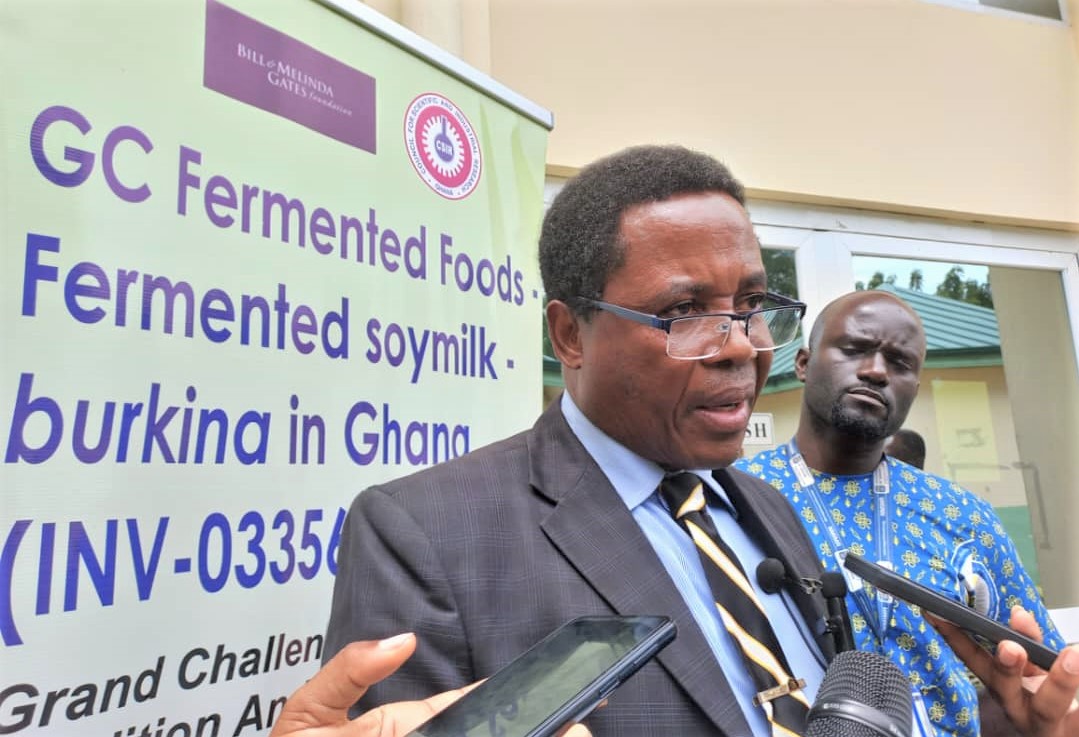
Accra, April 28, GNA-The Council for Scientific and Industrial Research (CSIR) Food Research Institute (FRI) has embarked on the commercialisation of all its research findings.
It is, therefore, seeking the right partnerships to make that materialised.
Professor Charles Tortoe, Director of the FRI who announced this in Accra said a unit had been created within his Institute, serving as the interface between research findings and other commercial entities, including Small Scale Enterprises (SMEs), individuals and processors who want to go into businesses for successful commercialisation of of its research findings.
Prof Tortoe was speaking at the launch of a new product, made out of soya and millet, serving as a beverage and known as « Agbenu » which was the outcome of a research finding carried out by the FRI.
“Agbenu” is an Ewe word derived from “Agbenudunu” meaning “life giving.”
“This product, basically is to enrich nutritional content, improve macro and micro nutrients in our systems when we take it,” Prof Tortoe explained.
He said by the launch of the product, the FRI had made it a commercial entity and looking forward for a commercial uptake.
The Bill and Melinda Gates Foundation sponsored the FRI to conduct the research into the product, dubbed the GC-Fermented Foods-Soyamilk-burkina in Ghana.
Two sibling research scientists, Dr Richard L. K. Glover and Dr Mrs Mary Glover-Amengor, led the research titled, the “Grand Challenge on Integrating Tradition and Technology for fermented Foods for Maternal Nutrition.”
Prof Tortoe said the FRI and the CSIR were looking forward to commercialising their research findings.
“In the past there has been this issue that research always rest on the shelf and we are changing that. We are taking the bull by the horn and commercialising all our research findings so that it can become accessible to SMEs, and individuals who want to go into commercialisation.
He said the Institute was coming out with more unique products such as the Agbenu product which they were seeking to commercialise to individuals and processors and in so doing “we are improving all the value actors on the soya value chain, we have the farmers, processors, marketers and traders who are all being enriched. Because there will be more production of the soya, more processing of it and more market.
“We look forward that this product will be commercialised in a manner that will be all over the country and be exported to neighbouring countries.
Dr Glover, who is also the Scientific Director, African Science Technology and Policy Institute, Pretoria, South Africa, said GC Fermented Food project was to investigate the effects of intake of soymilk-burkina, a novel Ghanaian indigenous fermented milk and millet beverage (smoothie), on the gut microbiome and nutritional status of women of reproductive age from 15-49 years living in the Volta and Oti Regions of Ghana.
The specific aim was to assess microbial quality in soymilk- burkina and also to determine the effects of soymilk-burkina on the gut microbiome diversity and nutritional status of Ghanaian
Dr Mrs Glover-Amengor, who works with the FRI on her part, said Burkina, as the drink that migrated from Burkina Faso is affectionately called in Ghana, is made with either dairy/ powdered milk or soy milk and millet.
However, the Soymilk substitution would enhance the nutritional and health benefits of burkina, while the use of soymilk in its production would ultimately boost the soybean market that finings being promoted, to enhance livelihoods of local farmers in Ghana.
Professor Paul Bosu, Director General, CSIR, commended the two siblings for leading the research and the Bill & Melinda Gates Foundation for collaboration with some institutions in Ghana: namely, the CSIR, the University of Health &Allied Sciences (UHAS) and NOGUCH, University of Ghana (UG) to conduct the research titled the ‘Effect of soymilkburkina intake on gut microbiome and nutritional status of Ghanaian women.
He expressed the joy that the output of “this study was to be a pilot data evaluating the effects of traditional fermented foods on gut microbiome and health axes in local populations.”
That he said had helped in ‘bringing’ out the Agbenu product.